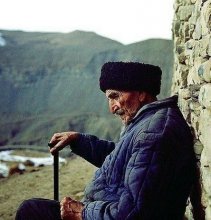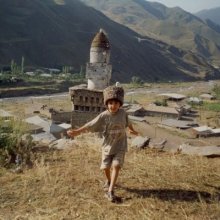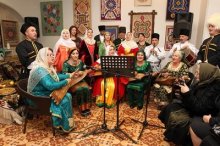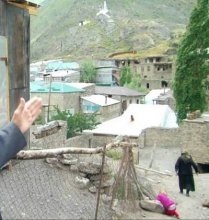 “To tell you the truth, I’m not a professional ‘man of letters’. But one day I got an ardent feeling, which turned into a burning question in my mind: why doesn’t my native people have its own writing system?”
“To tell you the truth, I’m not a professional ‘man of letters’. But one day I got an ardent feeling, which turned into a burning question in my mind: why doesn’t my native people have its own writing system?”
This is how Elisha (we’ll use this Biblical pseudonym for him) started the story of how he joined one of the Bible translation projects in the Caucasus. In our conversation, Elisha struck me as very eager to help, but equally reluctant to talk. His affability struggled with his firm determination to remain incognito, and only after my assurance that his name would not be revealed did Elisha start speaking at ease. His words proved to be a heartfelt testimony to the sense of responsibility and generosity so typical of the Caucasian cultures. During our half-hour interview, I was a total stranger who needed Elisha’s help, and he showed himself to be a most hospitable host who introduced me to the very best of his culture. Just an example: in many cultures of the Caucasus, asking a casual guest about the purpose of his visit is considered impolite. For three days a traveler can enjoy his host’s hospitality and protection for free. If he stays longer, he will be regarded as a member of the family and consequently a co-worker in the common household.
 The ethnic group to which Elisha belongs lives both in Dagestan (southern Russia) and in Azerbaijan. Elisha himself lives on the Azerbaijan side of the border, where his ancestral home and his roots are. By profession he is an agricultural specialist, but his burning desire to give a writing system and literature to his people is not a mere amateur’s emotional impulse. It was confirmed by his literary talent. “I started writing long-long ago,” Elisha recounts. “My literary debut was children’s poems. It was at that time that I started inventing new letters to represent my language’s sounds. Later, in 1994 an alphabet based on the Cyrillic script was created for my people in Dagestan, but in Azerbaijan the school education remains based on the Latin script, and we are not allowed to use Cyrillic alphabet… So I turned to oral genres. There is a good Azeri custom of playing songs at weddings, and I wondered whether it might be possible to compose lyrics for wedding songs in our language? Well, now when a wedding is celebrated among my people, it is my songs that reverberate in the air.” His words sounded humble and were pronounced casually. By no means were they a manifestation of the author’s pride, but rather a progress report about Elisha’s lifetime project. Indeed, Elisha is one of the very few people who is now writing professionally in his dialect. His language has 5 dialects in total, and his mother tongue is one of the two major ones, the very dialect spoken in Azerbaijan. The literary language of this people is based on another dialect, spoken mainly in Dagestan. People from Elisha’s dialect in Azerbaijan understand the literary dialect only up to 50-60%, not more.
The ethnic group to which Elisha belongs lives both in Dagestan (southern Russia) and in Azerbaijan. Elisha himself lives on the Azerbaijan side of the border, where his ancestral home and his roots are. By profession he is an agricultural specialist, but his burning desire to give a writing system and literature to his people is not a mere amateur’s emotional impulse. It was confirmed by his literary talent. “I started writing long-long ago,” Elisha recounts. “My literary debut was children’s poems. It was at that time that I started inventing new letters to represent my language’s sounds. Later, in 1994 an alphabet based on the Cyrillic script was created for my people in Dagestan, but in Azerbaijan the school education remains based on the Latin script, and we are not allowed to use Cyrillic alphabet… So I turned to oral genres. There is a good Azeri custom of playing songs at weddings, and I wondered whether it might be possible to compose lyrics for wedding songs in our language? Well, now when a wedding is celebrated among my people, it is my songs that reverberate in the air.” His words sounded humble and were pronounced casually. By no means were they a manifestation of the author’s pride, but rather a progress report about Elisha’s lifetime project. Indeed, Elisha is one of the very few people who is now writing professionally in his dialect. His language has 5 dialects in total, and his mother tongue is one of the two major ones, the very dialect spoken in Azerbaijan. The literary language of this people is based on another dialect, spoken mainly in Dagestan. People from Elisha’s dialect in Azerbaijan understand the literary dialect only up to 50-60%, not more.
 In the Bible translation projects that IBT conducts in Muslim regions, the situation usually looks like this: the translator is a Muslim who is deeply concerned with preserving his/her native language and sees the Bible as an excellent tool for language development. This is a conscientious scholarly approach, and though it is a secular one, it may prove quite fruitful and the only possible one to have the Bible translated in the given circumstances. But there was evidently something more behind Elisha’s decision to become involved in this project than merely a deep-seated care for his mother tongue. He had thought through an original and profound philosophical concept of human upbringing and education, and he gave the Bible a crucial role in his concept.
In the Bible translation projects that IBT conducts in Muslim regions, the situation usually looks like this: the translator is a Muslim who is deeply concerned with preserving his/her native language and sees the Bible as an excellent tool for language development. This is a conscientious scholarly approach, and though it is a secular one, it may prove quite fruitful and the only possible one to have the Bible translated in the given circumstances. But there was evidently something more behind Elisha’s decision to become involved in this project than merely a deep-seated care for his mother tongue. He had thought through an original and profound philosophical concept of human upbringing and education, and he gave the Bible a crucial role in his concept.
“I may teach a first-grade pupil to read and write,” he started explaining his point of view, “but what’s next? Let’s say we even have a novel in our language. But before a child can start reading this novel, we should be able to give him something else. Look at the Bible! Here we have not a single book of a certain genre, but an entire library! It contains so much for all humankind. This is my opinion: first you go to kindergarten, then you enter school, and then – you turn to religion! Indeed religion should be seen as having an equal footing with the educational steps, because they serve the same purpose: to help a human being to become a Human with a capital letter. Kindergarten and school have their own programs, but religion is something higher than these programs. The Koran says that all the books sent by God, and not only the Koran itself, should be trusted. A person must believe all the prophets, not just one of them. If I refuse to believe even one of the prophets, then I am not a true Muslim. To help a human being become a true human being is the fundamental purpose of all true religions. God has hundreds of names, and people address Him differently. Nonetheless He is One.  We should start building from the foundation of the Bible, for the Bible is the history of mankind. And can you imagine? My people has no Bible translation at all. What a deficiency! Those who live in Dagestan and know Russian may find at least a Russian translation, but I couldn’t find any in Azerbaijan until I started working on the translation myself and got an Azeri Bible from the team. Otherwise I would have never seen a Bible at all! Isn’t this proof that the translation is very needed? That’s why I made a decision to translate. Some of my associates asked me, ‘Why did you get involved with this? Those who want to read the Bible – let them search for a Russian one and read that.’ But I wanted the Bible texts to become available in my own language. I simply know that this is how it should be.
We should start building from the foundation of the Bible, for the Bible is the history of mankind. And can you imagine? My people has no Bible translation at all. What a deficiency! Those who live in Dagestan and know Russian may find at least a Russian translation, but I couldn’t find any in Azerbaijan until I started working on the translation myself and got an Azeri Bible from the team. Otherwise I would have never seen a Bible at all! Isn’t this proof that the translation is very needed? That’s why I made a decision to translate. Some of my associates asked me, ‘Why did you get involved with this? Those who want to read the Bible – let them search for a Russian one and read that.’ But I wanted the Bible texts to become available in my own language. I simply know that this is how it should be.
The Bible is not a fairy-tale, but very serious reading, and translating it is no joke. Indeed it’s very difficult to translate. Sometimes there are just 2-3 lines of text, but I am thinking them over for days and days. This is how I searched for a rendering of Gen 1:6-7, where it is said that ‘God made the expanse and separated the waters that were under the expanse from the waters that were above the expanse.’ It has been scientifically proven that 600 million tons of water fall on earth in the form of rain daily, but that’s not all: the ocean is also water. If there was no second layer of water, there would be no water cycle and no life on earth at all. We are alive thanks to the second level of water, so it was not in vain that God separated the visible waters from those that we do not see. This sense was very difficult to convey in the text itself, but I finally succeeded. Extended commentary in such situations is no good – the translation itself should be terse and clear, because when you deal with Bible translation, one single incorrect word may guide the reader onto an incorrect path of interpretation.”
 The Bible translation described in this newsletter is a SIL Int’l project with IBT participation. IBT provides the translation consultant, while our colleagues from SIL coordinate the translation work. On the immediate agenda is a series called “Stories of the Prophets”. These include the story of the Creation and the first people (“The Beginning”), the stories of Noah’s Flood and the Tower of Babel, and the story of King Solomon (“The Wisest Man on Earth”) with a selection of verses from Proverbs to illustrate his wisdom. The story of Abraham has also been drafted, and five Parables from the Gospel of Luke have been translated and audio recorded. But in order to publish anything in Azerbaijan, the state committee on printing has to give its approval. Otherwise there will only be online publications in this project. In spite of this difficulty, all the translated materials received positive reviews during field-testing. They are interesting to common people no less than they are interesting to their translator.
The Bible translation described in this newsletter is a SIL Int’l project with IBT participation. IBT provides the translation consultant, while our colleagues from SIL coordinate the translation work. On the immediate agenda is a series called “Stories of the Prophets”. These include the story of the Creation and the first people (“The Beginning”), the stories of Noah’s Flood and the Tower of Babel, and the story of King Solomon (“The Wisest Man on Earth”) with a selection of verses from Proverbs to illustrate his wisdom. The story of Abraham has also been drafted, and five Parables from the Gospel of Luke have been translated and audio recorded. But in order to publish anything in Azerbaijan, the state committee on printing has to give its approval. Otherwise there will only be online publications in this project. In spite of this difficulty, all the translated materials received positive reviews during field-testing. They are interesting to common people no less than they are interesting to their translator.
The main target of this project is Scripture Engagement. In 2018 IBT will hold a Scripture Engagement seminar for the North Caucasus language. We need to raise funds for this seminar to cover the costs for 20 participants for 5 days (including travel costs, food, accommodation, and additional expenses, such as Internet). Your support for the seminar would be greatly appreciated.
If you prefer to send your donation through a forwarding agent in the U.S. or Europe,
please write to us and we'll provide the details of how this can be done.

Share: